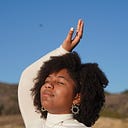Embodying Freedom in Honor of the Ancestors
I’ve been called a ‘free spirit’ many times by my peers. While they may simply be commenting on my feather earrings and crystal necklaces, being a proud, Afro-Indigenous, free-spirited woman is so much more than aesthetics for me.
For me, freedom is a way of being, an embodiment of my whole self despite this country’s efforts to box, mitigate, and erase me. I like to think of it as a reflection of the intentional choice I make every day to embody freedom in honor of my ancestors.
Yet, the notion of ‘freedom’ and embodying it is something I’ve grappled with and reworked for many years. In a country where the cost of living continues to rise, large corporations continue to destroy my sacred lands, and the institutions continue to incarcerate my community, defining freedom for myself and my community has never been more pressing. I often find myself asking the question; How do we, individually and collectively, embody freedom right now?
The answer to this question lies in the stories of our ancestors.
For the past few years, I’ve explored my spirituality as it relates to my ‘Blackness’ — traveling to different parts of the diaspora to discover the stories of our ancestors and how they have manifested themselves in the experiences of African descendants.
In Cuba, I learned the history of Santeria — how the Yoruba people synchronized their African deities to Catholic saints in order to protect their practice from forced erasure. In New Orleans, I discovered that the Congo Square, with its circular tiles, was once a site for radical resistance and organized ritual work. Enslaved men and women would gather on Sundays (the Day of Rest according to the ‘Code Noir’ law), creating drum circles to hide freedom rituals performed in the middle from white onlookers.
More recently, as I’ve reconnected with my Powhatan and Cherokee ancestors, I’ve learned of the ways Native Americans around the continent have preserved their sacred knowledge and practices meant to be “forcibly forgotten” under official U.S. government policy to “civilize the Indians.” Many elders and descendants went through great extremes to safeguard and keep the spiritual traditions alive, dedicated to “never forget” — but instead fortifying and perpetuating the sacred ways as an act of resistance.
My ancestors clung to their traditional customs and practices despite pressures from the Western world to erase their identities as a means of claiming their freedom — creating their own spaces (within the confines of what was possible) of radical resistance and authentic self-expression. It is through communion with our ancestors that we understand how to claim freedom for ourselves in the present.
In Black Utopias, Professor Jayna Brown makes a case for ‘utopia’ not as a time or place we anticipate arriving at, but rather a state of consciousness we as Black folks can tap into in our waking present.
Like utopia, freedom is not something we can wait for or ask permission to be. It is not a destination or an event that takes place in the future.
Free is what I choose to be right now.
It’s what our ancestors carved out for themselves, first in their spirit and finally manifested in the physical. Through our ability to traverse different “realities,” reclaim our identities and create spaces to be our authentic selves fully, we are able to find our freedom.
